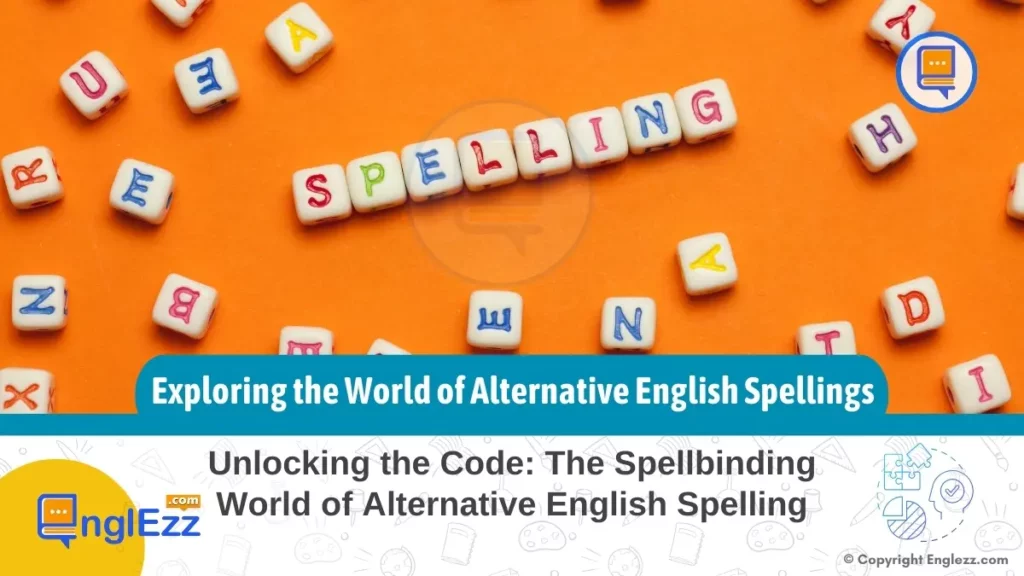Step into a world where words bend and twist, where the familiar dance of letters takes on new forms and meanings. Welcome to the enchanting realm of alternative English spellings – a landscape teeming with possibility and intrigue. Here, each variation whispers tales of language evolution, hinting at the vibrant tapestry of linguistic history that weaves through our communication norms.
Table of Contents
- Exploring the World of Alternative English Spellings
- The Evolution of Alternative
- Impact Of Alternative English Spellings on Communication
- Famous Examples in Alternative Spelling
- Teaching Alternative English Spelling
- Navigating Challenges in Teaching Alternative Spelling
- Embracing Language Diversity Through Spelling Variations
- Uniting Language Through Varied Spellings
- Final Tips
- Uniting Language Through Varied Spellings
- FAQs:
- Q1: Why do alternative English spellings exist?
- Q2: Are there rules for alternative spellings in English?
- Q3: How can educators incorporate alternative spellings in teaching?
- Q4: What are the advantages of learning about alternative English spellings?
- Q5: Can embracing alternative spellings improve communication skills?
Exploring the World of Alternative English Spellings
Unraveling the threads of time, we embark on a journey through the rich tapestry of alternative English spellings. Beyond mere letters on a page, these variations hold profound implications for how we understand and interpret language. They are not just deviations from the norm but windows into the past, reflecting cultural influences and societal shifts that have shaped our written expression over centuries.

As we examine this labyrinthine web of spelling eccentricities, we begin to grasp the subtle yet powerful impact they wield on our shared linguistic landscape. Join us as we explore the hidden treasures buried within these unconventional spellings, illuminating paths to untold narratives waiting to be discovered. Explore the Spelling Revolution with us! Delve into unique English spellings, unleash your linguistic imagination, and revolutionize your writing.
The Evolution of Alternative
English spellings is a fascinating journey that intertwines historical context with linguistic adaptation. By tracing back the origins of these variations, we uncover a tapestry woven with influences from different periods and regions. For instance, the Great Vowel Shift in Middle English led to significant changes in pronunciation that affected spelling patterns, contributing to the rich diversity we see today. Words such as “night” and “light,” with their silent letters, exemplify how historical shifts have shaped modern spelling conventions.
Exploring famous examples of alternative spellings across different eras showcases language’s fluid nature and its responsiveness to cultural shifts. From the archaic spellings of words like “ghost” (“gast”) in Old English to French influences on Medieval English spelling seen in words like “debt” (“dette”), each era reflects a unique blend of linguistic heritage. These variations not only illustrate how language adapts over time but also highlight the intrinsic link between culture and communication norms.
Cultural influences play a crucial role in sculpting alternative English spellings, imprinting regional identities onto written language. For example, American English diverged from British English in not just pronunciation but also spelling – think “color” versus “colour.” This divergence underscores how societal contexts shape linguistic expression and how alternative spellings are emblematic of cultural distinctiveness. Understanding these nuances opens windows into the complex interplay between history, culture, and language evolution, shedding light on the enduring significance of alternative spellings in bridging past traditions with contemporary communication practices.
Impact Of Alternative English Spellings on Communication
When dealing with the realm of alternative English spellings, one cannot overlook their profound impact on communication dynamics. These deviations from traditional spelling norms not only enrich language expression but also offer a fascinating insight into the nuances of linguistic diversity.
Alternative spellings have the power to add layers of meaning to words, providing a unique lens through which individuals can convey their thoughts and emotions with precision. For instance, the variation between “color” in American English and “colour” in British English not only reflects regional distinctions but also embodies a sense of cultural heritage within each spelling.
Furthermore, alternative English spellings serve as vivid reflections of regional dialects and societal intricacies. By exploring these diverse spellings, one can unravel the vibrancy and complexity that underpin different linguistic identities across various communities. For instance, the use of “thru” instead of “through” in informal contexts showcases how language adapts to everyday discourse while retaining its core essence. Understanding these variations not only enhances cross-cultural communication but also fosters appreciation for the intricate tapestry of human expression embodied in alternative spellings.
In educational settings, navigating alternative English spellings presents both challenges and advantages that educators must carefully consider. While these variations can stimulate critical thinking skills and expose learners to linguistic diversity, they may also pose barriers to comprehension for some students. Emphasizing inclusive language practices becomes paramount in fostering an environment where all learners feel valued and understood regardless of their familiarity with alternate spelling conventions. By embracing these challenges as opportunities for growth and exploration, educators can instill a deeper appreciation for language diversity among students, fostering a culture of inclusivity and respect within educational spaces.
Famous Examples in Alternative Spelling
Exploring famous examples of alternative English spellings offers a fascinating glimpse into the dynamic nature of linguistic evolution. Words like “colour” and “theatre” showcase British English’s distinct spelling conventions compared to American English, illustrating how regional differences have influenced spelling norms over time. These variations not only reflect cultural identities but also emphasize the fluidity of language as it adapts to diverse contexts. The alternative spellings of these words serve as symbolic markers that celebrate the richness and complexity of the English language.
Moreover, examining well-known terms such as “program” versus “programme” or even “center” versus “centre” reveals how alternative spellings can coexist within a shared language, showcasing the adaptability and versatility of English in accommodating various preferences. These differences often stem from historical influences or stylistic choices and underscore the ever-evolving nature of language. For instance, both spellings are widely accepted but may convey subtle nuances in formal or informal contexts, highlighting the nuanced interplay between spelling variants and communication dynamics.
In contemporary popular culture, creative adaptations of alternative spellings further demonstrate their enduring relevance in modern discourse. From brand names like “Tumblr” to artistic expressions through typography and design, alternative spellings are leveraged to evoke specific tones or capture unique aesthetics. By exploring how these variations resonate with diverse audiences, we gain insights into how language continues to be reshaped creatively through innovative spelling practices. This creative engagement with alternative English spellings not only sustains linguistic diversity but also fuels ongoing conversations about the power of language to evolve and inspire across cultural landscapes.
Teaching Alternative English Spelling
In the realm of education, innovative teaching approaches are key to engaging students and enhancing learning outcomes. When it comes to alternative English spellings, educators have been exploring creative ways to incorporate these variations into their curricula. By showcasing how different historical periods have influenced spelling conventions, teachers can provide students with a deeper understanding of language evolution. For instance, comparing traditional Shakespearean spellings to modern-day equivalents can offer a fascinating insight into the fluidity of language over time.
Digital tools have revolutionized the landscape of language education, offering interactive platforms that make mastering alternative English spellings enjoyable and efficient. From gamified spelling apps to online resources with phonetic pronunciation guides, these tools cater to diverse learning styles and enhance language acquisition experiences. Students can now engage with spelling practice in dynamic ways that go beyond rote memorization, fostering a more interactive and personalized approach to linguistic development.

One emerging trend in language education is the emphasis on cultural appreciation through diverse spelling conventions. By introducing students to alternative spellings from various regions and time periods, educators not only foster critical thinking skills but also promote a deeper understanding of cultural nuances embedded within language. Through this lens, students learn not only how words are written but also gain insights into the historical contexts that shaped them. Embracing diverse spelling practices allows for a richer exploration of linguistic diversity and encourages students to celebrate the intricacies of global communication.
By incorporating these innovative approaches into teaching practices, educators unlock new avenues for student engagement and language mastery. The use of digital tools alongside an exploration of diverse spelling variations not only enhances educational experiences but also nurtures a sense of curiosity and cultural awareness among learners. As language continues to evolve, embracing alternative English spellings becomes not just a pedagogical necessity but a celebration of the diversity and richness inherent in our shared human experience.
Alternative English spelling practices can present challenges for educators, but understanding common misconceptions is the first step to mastery. One prevalent misconception is that alternative spellings are errors or deviations from the standard, when in fact they often reflect historical roots or regional variations. Educators can guide students by highlighting the richness and diversity of language evolution, encouraging them to explore these variations with curiosity rather than apprehension. By fostering a positive attitude towards alternative spellings, teachers can empower learners to embrace linguistic diversity with confidence.
Integrating diverse spelling variants into educational frameworks requires flexibility and creativity. Educators can adopt adaptive teaching methodologies that cater to different learning styles, such as incorporating visual aids, mnemonic devices, or interactive games centered around alternative spellings. Providing students with opportunities for hands-on exploration and practice can help solidify their understanding while making learning engaging and enjoyable. By creating a supportive environment that values experimentation and learning from mistakes, educators can encourage students to explore the nuances of alternate spellings with enthusiasm.
Embracing Language Diversity Through Spelling Variations
The beauty of language diversity shines through alternate English spelling practices found across global contexts. Embracing these variations not only enriches communication but also promotes inclusivity and cultural sensitivity within academic discourse. By acknowledging and celebrating the myriad ways in which language manifests itself through spelling variations, educators can instill in their students a deep appreciation for the kaleidoscope of voices that shape our linguistic landscape.
Uniting Language Through Varied Spellings
In conclusion, the exploration of alternative English spellings unveils a world teeming with history, cultural influences, and creative expressions. By embracing linguistic diversity through varied spellings, we foster unity through understanding and respect for one another’s unique ways of communication. As educators embark on this journey of discovery alongside their students, they sow the seeds of curiosity and empathy that lead to a more inclusive and harmonious world where language truly becomes a bridge connecting hearts and minds across borders.
Final Tips
As you navigate the intriguing world of alternative English spellings, here are three essential tips to enhance your teaching and understanding of this linguistic phenomenon.
Embrace Creativity in Teaching: Encourage students to explore alternative spellings creatively by incorporating them into fun activities such as word searches, crossword puzzles, or writing prompts. By making learning engaging and interactive, students can develop a deeper appreciation for the richness of language diversity. For example, encourage learners to create their own texts using alternative spellings to express their creativity while embracing linguistic variations.
- Foster Cultural Awareness: Use alternative spellings as a gateway to discussions about cultural influences on language. Help students recognize how historical events and societal changes have shaped spelling conventions over time. For instance, explore how words like “color” (American English) and “colour” (British English) reflect regional differences in spelling while highlighting the interconnectedness of language with culture and history.
- Promote Critical Thinking Skills: Encourage students to critically analyze the reasons behind alternative spellings and their impact on communication. Discuss how nuances in spelling can convey different meanings or emphasize particular cultural contexts. By engaging in discussions about why certain words have variant spellings, learners can sharpen their analytical skills and develop a deeper understanding of linguistic evolution. For example, compare the diverse spellings of “center” (American English) and “centre” (British English) to illustrate how these variations reflect both language diversity and historical developments.
By implementing these tips in your teaching practices, you can unlock the educational potential of alternative English spellings, fostering a dynamic learning environment that celebrates linguistic diversity and encourages curiosity about the evolving nature of language.
Uniting Language Through Varied Spellings
In a world where language is a vibrant tapestry woven by diverse cultures and histories, alternative English spellings stand as testament to the ever-evolving nature of communication. As we’ve journeyed through the rich tapestry of linguistic variations and historical influences, it becomes evident that embracing alternative spellings is not merely about letters on a page but about celebrating the kaleidoscope of human expression. By tackling the unconventional spelling practices, we unearth hidden narratives of resilience, adaptation, and creativity that have shaped the very fabric of our global language landscape.
Through this exploration of alternative English spellings, we invite educators, language enthusiasts, and lifelong learners to see beyond words alone and glimpse the vast spectrum of human experiences encoded within varied spellings. Let us continue to unlock the mysteries and intricacies of language together, fostering an inclusive environment where every variant spelling becomes a bridge connecting hearts and minds across different corners of our interconnected world.
FAQs:
Q1: Why do alternative English spellings exist?
Alternative English spellings reflect historical changes in pronunciation, cultural influences, and linguistic evolution over time. They add depth to our understanding of language development.
Q2: Are there rules for alternative spellings in English?
While conventional spelling rules exist, alternative spellings often stem from dialectical variations or creative adaptations rather than rigid guidelines.
Q3: How can educators incorporate alternative spellings in teaching?
Educators can integrate diverse spelling variants by exploring them within historical context, engaging students in critical thinking activities related to spelling transformations.
Q4: What are the advantages of learning about alternative English spellings?
Studying alternates helps nurture appreciation for linguistic diversity, enhance comprehension skills by recognizing varied interpretations, and foster connections with different cultural perspectives.
Q5: Can embracing alternative spellings improve communication skills?
By embracing various spelling conventions, individuals can develop flexibility in language usage, empathy towards diverse perspectives, and an enriched ability to interpret nuanced textual expressions.









Uncover a linguistic treasure trove with the Spelling Revolution! Embark on a journey through alternative English spellings and redefine language.